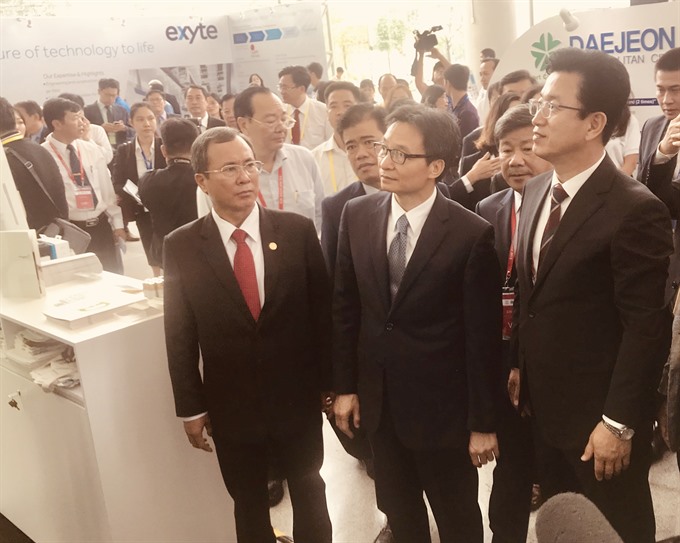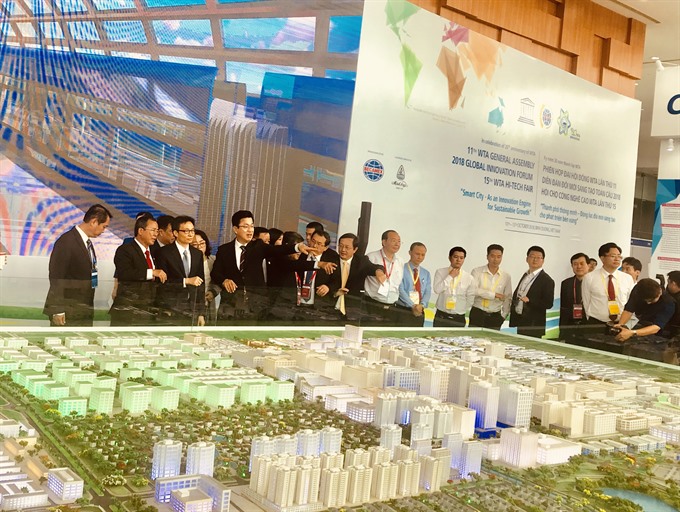 Society
Society

Smart city planning should place people at the centre of development, with no one left behind, Deputy Prime Minister Vũ Đức Đam said yesterday (Oct 11) at an international conference held in Bình Dương Province.
 |
| Deputy Prime Minister Vũ Đức Đam (centre) visits the 15th WTA Hi-Tech Fair themed “Smart City – As an Engine for Sustainable Growth” which opened on October 11 in Bình Dương as part of the WTA Summit 2018. — VNS Photo Bồ Xuân Hiệp |
BÌNH DƯƠNG — Smart city planning should place people at the centre of development, with no one left behind, Deputy Prime Minister Vũ Đức Đam said on October 11 at an international conference held in Bình Dương Province.
Speaking at the opening ceremony, Đam said: “We are living in a world of modern technology where there are both opportunities and challenges. If a country is willing to take the lead in innovation and technology application, it will benefit more than others.”
In recent years, building smart cities has become increasingly affordable with the use of advanced technology.
However, Đam noted that smart cities must be built according to the conditions of each country.
In Việt Nam, many smart city models face huge challenges due to a lack of know-how, experience and highly skilled human resources.
As a city’s population grows, unemployment, traffic congestion, energy shortages and pollution can increase, according to Đam.
“We have no better choice than to build a smart city by running it efficiently,” he said. “Smart city planning must serve the lives of people, all of whom should be part of the development."
Đam said Việt Nam was expected to achieve a growth rate of 6.8 per cent this year and maintain high growth in coming years.
“Developing skilled human resources and establishing a comprehensive Government database to ensure transparency are among the key tasks to build smart cities in Việt Nam,” he told the media.
Trần Thanh Liêm, chairman of Bình Dương Province, said construction of a smart city would be the driving force to overcome challenges and turn the city into a modern and sustainable urban area.
Her Tae-Jeong, president of the World Technopolis Association (WTA), said the conference sought to promote discussions about sustainaibilty and innovation among institutions, cities and countries.
He said a number of smart city projects faced challenges because their roles were limited to controlling public information and supervising public services.
However, a smart city should grow beyond these activities by making things “more intelligent and inclusive”, he said.
Also speaking at the opening ceremony, Michael Croft, head of the UNESCO Office in Hà Nội, said the concept of a smart city was much broader than technology.
“A true smart city is a city that creates sustainable economic development and quality of life by excelling in multiple key areas, such as the economy, mobility, environment, inclusiveness, and governance,” he said.
The science, technology and innovation act as a powerful platform to achieve these objectives, he said.
“UNESCO is working closely with national and local authorities, the private sector and civil societies to ensure that the principles of sustainability are embedded within development, and that no one is left behind,” he told Việt Nam News.
 |
| Deputy Prime Minister Vũ Đức Đam visits the 15th WTA Hi-Tech Fair themed “Smart City – As an Engine for Sustainable Growth” which opened on October 11 in Bình Dương as part of the WTA Summit 2018. — VNS Photo Bồ Xuân Hiệp |
Global Innovation Forum
Speaking at the 2018 Global Innovation Forum held the same day as part of the summit, Richard A. Levao, president of the US-based Bloomfield College, said that the global urban population is expected to reach 6.5 billion by 2050 and eight billion by 2100, according to figures from the UN.
Because of the population explosion, the smartest possible solutions are needed for housing, feeding and transporting people and satisfying their need for employment, recreation, education and medical care in hyper-concentrated settlements, he said.
“Medical services alone are of the greatest seriousness and are essential, for example, to address the rapid spread of contagious diseases, which are facilitated by populations living in close proximity, and by global mobility of individuals, which can turn local outbreaks into potential pandemics,” Levao noted.
He also pointed out the vulnerabilities in linking many smart devices, especially the risk of cybercriminals.
“Opportunities for sabotage, whether for financial gain or terrorist disruption, must always be kept in mind as we have seen increasing levels of automated decision-making to smart strategies,” he said.
In addition, planning a smart city is more difficult in older or historical cities in comparison to starting one from scratch, Levao added.
“The deeply felt need to preserve the uniqueness and character of these great centres of civilisation pose a significant challenge. A balance of change and accommodation is not easy at all,” he said.
Dr Ing Jürgen Pietsch of the Urban Innovation Ecosystems Lab based in Hamburg, Germany, said that cities were facing enormous challenges, such as climate change, demographic aging, and natural resource depletion.
Ecosystems play an important role in facilitating transformations needed to address these challenges.
Functioning ecosystems provide flexibility in urban landscapes to build adaptive capacity and cope with problems such as increasing risks of heat waves and flooding, he said.
As part of the event, the 15th WTA Hi-Tech Fair themed “Smart City – As an Engine for Sustainable Growth” also opened.
The exhibition showcased cutting-edge technologies and services, featuring a line-up of strategic business matching programmes and networking opportunities.
Other events included the 11th WTA General Assembly, including mayors’ meetings and university-academics meetings, among others.
On August 16, the province’s capital, Bình Dương City, became the first member in Việt Nam to be selected as an official member of WTA, which has 106 members from 48 countries and territories.
On this occasion, WTA is celebrating its 20th anniversary.
In recent years, Bình Dương has made great strides in smart city development with participation from the State authorities, scientists and enterprises.
Around 100 members of the WTA from nearly 50 countries and territories are taking part in the two-day WTA Summit 2018. — VNS




